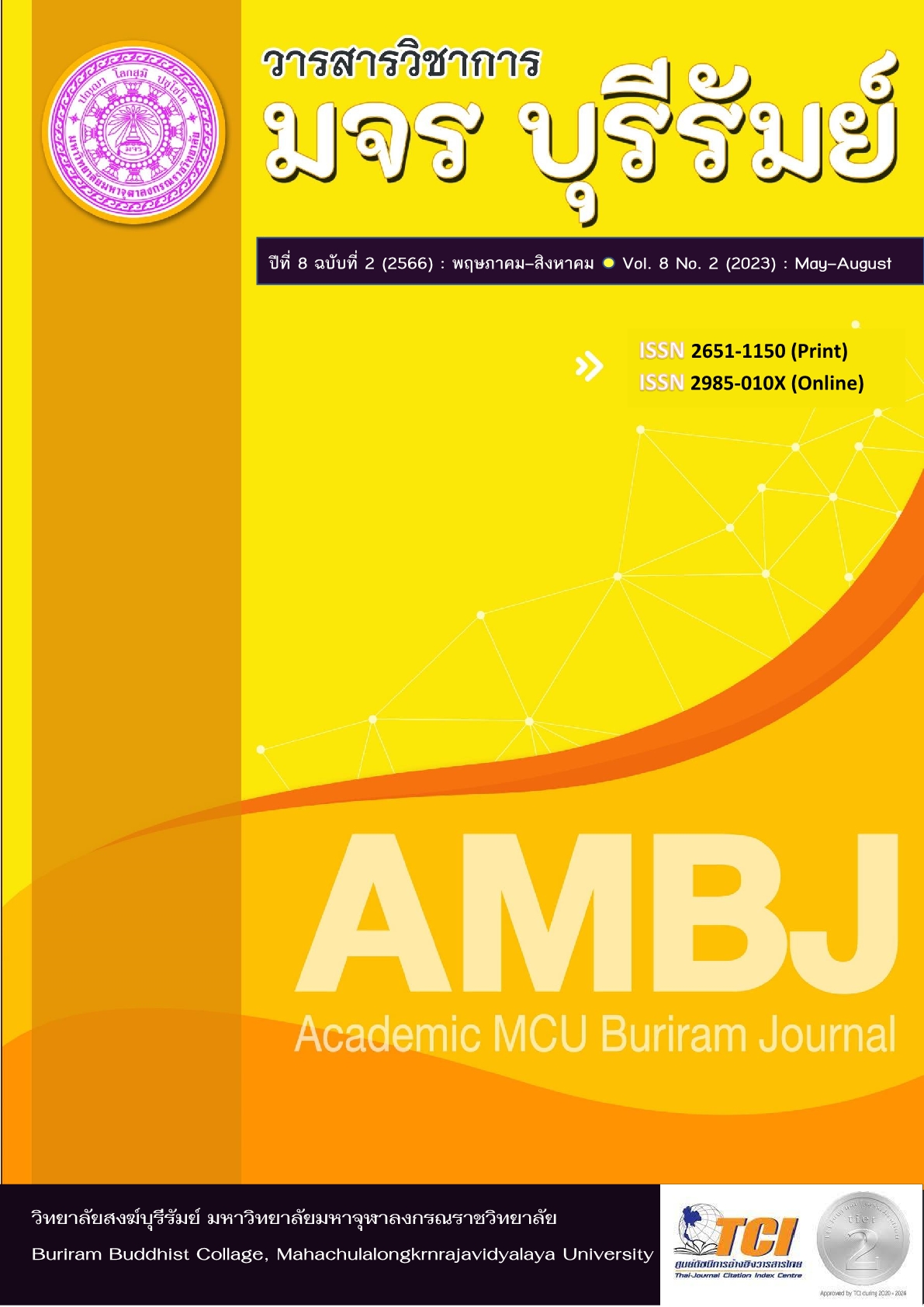Development of Learning Activities for the ED2071 Early Childhood Literature Course for 3rd Year Students in Early Childhood Education Program Mahamakut Buddhist University Roi Et Campus using active Learning Teaching Techniques
Keywords:
Learning Activities, Literary, Early Childhood EducationAbstract
The purposes of this research were: 1) to develop an active ED 2071 literary early childhood literary course using active learning techniques 2) to compare the academic achievements of 3rd year students in early childhood education before and after ED 2071 early childhood literature course 3) to study the satisfaction of 3rd year early childhood education with ED 2071 literary early childhood literary course. The research pattern is that The One Group Pretest - Posttest Design was obtained by selecting a specific type of 15 people. The research tools were Course ED 2071 Inderal Literature 2) Learning Activity Model with ED 2071 Early Childhood Literary 3) Academic Achievement Assessment with ED 2071 Early Childhood Literary 4) The Satisfaction Questionnaire on the Use of Learning model. The data were analyzed by percentage, mean, standard deviation and t-test.
The research results found that:
1. Results of development of learning activities ED 2071 Early Childhood Literature TAPSCA Model. The concepts that are the components of the learning model are: 1) Contemplative Education 2) Proactive learning 3) Concept Maps 4) Learning reflection with the process of organizing learning activities in 6 stages: 1) Twinkle 2) Appreciation 3) Practice 4) Share 5) Conclusion 6) After action Reflection.
2. Comparison of results after studying ED 2071 Literature for early childhood Early childhood education students have academic achievement. significantly higher at the .05 level.
3. 3rd year early childhood education students are satisfied with the learning style in the ED 2071 early childhood literature program. After the experiment, there was an overall assessment result. The mean was at a high level ( = 4.15) When considering each side, it was found that the aspect with the highest mean was the learning activities process. at a high level (
= 4.49) followed by learning atmosphere the average was at a high level (
= 4.41) while the lowest average was media and learning resources. The mean was at a high level (
= 3.38) have similar averages and are related respectively.
References
ไชยยศ เรื่องสุวรรณ. (2553). เทคโนโลยีการศึกษา ทฤษฎีและการวิจัย. กรุงเทพฯ: โอเดียนสโตร์.
ณัฏฐวุฒิ ทรัพย์อุปถัมภ์. (2553). การจัดการเรียนรู้แบบใฝ่รู้ (Active Learning) ที่มีผลต่อพฤติกรรมการเรียนรู้ ผลสัมฤทธิ์ทางการเรียนและความพึงพอใจในการเรียนรายวิชาภูมิปัญญาเพื่อการพัฒนาคุณภาพชีวิต (0021311). มหาวิทยาลัยราชภัฏรำไพพรรณี. รายงานวิจัย. คณะมนุษยศาสตร์และสังคมศาสตร์: มหาวิทยาลัยราชภัฏรำไพพรรณี.
เดชดนัย จุยชุม, เกษรา บาวแชมชอย, และศิริกัญญา แกนทอง. (2559). การพัฒนาผลสัมฤทธิ์ทางการเรียน เรื่อง ทักษะการคิดของนักศึกษาในรายวิชาทักษะการคิด (Thinking Skills) รหัสวิชา 11-024-112 ประจำภาคเรียนที่ 1 ปีการศึกษา 2558 ด้วยการเรียนรู้แบบมีสวนรวม (Active Learning). วารสารมหาวิทยาลัยนราธิวาสราชนครินทร์ สาขามนุษยศาสตร์และสังคมศาสตร์, 3(2), 47-57.
นนทลีพร ธาดาวิทย์. (2559). การจัดการเรียนรู้แบบ Active Learning. กรุงเทพฯ: ทริปเพิ้ล เอ็ดดูเคชั่น.
พระมหาอรรถพงษ์ อตถญาโน, บัญชา เกียรติจรุงพันธ์, คชา ประณีตพลกรัง, บัญชา ธรรมบุตร. (2562). การพัฒนาการจัดการเรียนรู้เชิงรุกในวิชาหลักภาษาไทย. วารสารครุศาสตร์มหาวิทยาลัยราชภัฏสกลนคร, 1(1), 1-9.
วิจารณ์ พานิช. (2555). วิถีสร้างการเรียนรู้เพื่อศิษย์ใน ศตวรรษที่ 21. กรุงเทพฯ: มูลนิธิสดศรีสฤษดิ์วงศ์.
สำนักงานคณะกรรมการการศึกษาขั้นพื้นฐาน. (2562). รายงานความก้าวหน้าการจัดการเรียนรู้ ระดับการศึกษาขั้นพื้นฐานปี 2561-2562. กรุงเทพฯ: สำนักงานเลขาธิการสภาการศึกษา.
Chickering, Arthur W., and Zelda F. Gamson. March. (1987). Seven Principles for Good Practice in Undergraduate Education. AAHE Bulletin. American Association for Higher Education. Washington, D.C.
Bonwell, C.C.; & Eison.J. A. (1991). Active Learning: Creative Excitement in the Classroom. ASHE-ERIC Higher Education Reports No. 1. Washington, D.C. Chickering, Arthur W., and Zelda F. Gamson. March. (1987). Seven principles or good Practice. AAHE Bulletin 39: 3-7. ED 282 491. 6pp. MF-01; PC-01.
Mckinney, S.E. (2008). Developing Teachers for High-Poverty Schools: The Role of the Internship Experience. Urban Education. 43(1), 68-82.
Sweller,J. (2006). The worked example effect and human cognition: Learning and Instruction. New Jersey: Educational Technilogies.
Downloads
Published
How to Cite
Issue
Section
License
Copyright (c) 2023 Academic MCU Buriram Journal

This work is licensed under a Creative Commons Attribution-NonCommercial-NoDerivatives 4.0 International License.
ทัศนะและความคิดเห็นที่ปรากฏในบทความวารสารฉบับนี้ถือเป็นความรับผิดชอบของผู้เขียนบทความนั้น ไม่ถือเป็นทัศนะและความรับผิดชอบของบรรณาธิการ





